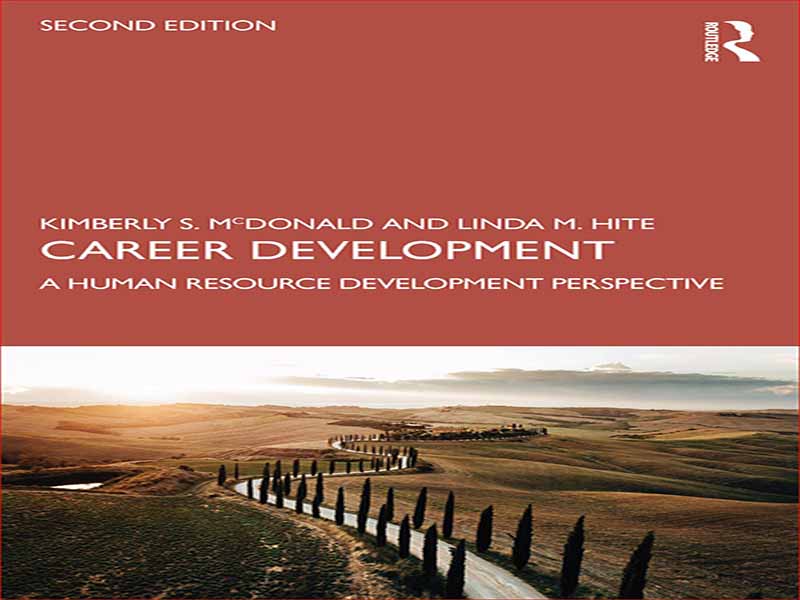- عنوان کتاب: Career Development – A Human Resource Development Perspective
- نویسنده: Kimberly S. McDonald
- حوزه: مدیریت منابع انسانی
- سال انتشار: 2023
- تعداد صفحه: 259
- زبان اصلی: انگلیسی
- نوع فایل: pdf
- حجم فایل: 7.79 مگابایت
این کتاب در مورد مشاغل و چگونگی توسعه آنها است، اما برای درک معنای داشتن یک حرفه، باید از یک سطح اساسی تر شروع کنیم، به طور خاص، کار و نقشی که در زندگی ما ایفا می کند. معنادار بودن کار در زندگی جذابیت جهانی و پایدار دارد، همانطور که در این نقل قول منسوب به بودا مشاهده می شود: “کار شما این است که کار خود را کشف کنید و سپس با تمام وجود خود را به آن بسپارید.” ناظر بعدی مشاغل، B.C. فوربس، بنیانگذار مجله فوربس، تشخیص داد که این مسیر ممکن است آسان نباشد: «خود را نه به عنوان معمار حرفه خود، بلکه به عنوان یک مجسمه ساز در نظر بگیرید. انتظار داشته باشید که باید چکش کاری سخت و اسکنه کاری و خراش دادن و پرداخت زیاد انجام دهید. کار و مشاغل چنان بخش جدایی ناپذیر زندگی هستند که گفتمان اختصاص یافته به آن موضوعات مرتبط قرن ها را در بر می گیرد و از رسانه های اجتماعی و مطبوعات محبوب گرفته تا مقالات و کتاب های علمی گسترش می یابد. به عنوان مثال، در اواسط دهه نوزدهم، مقالهای در مجله فورچون با عنوان «چرا کار میکنیم» منتشر شد (Dumaine & Sample, 1994). واضح ترین پاسخ به نظر می رسید پول درآوردن. با این حال، هدف مقاله این بود که کار چیزی بیش از امنیت مالی را شامل می شود. نویسندگان به نقل قولی از وارن بنیس، محقق برجسته رهبری قرن بیستم استناد کردند: «کار واقعاً مشخص می کند که شما چه کسی هستید. بسیاری از عزت نفس یک فرد با موفقیت در کار سنجیده می شود» (Dumaine & Sample, 1994, p. 198). در حالی که برخی در درجه اول برای تامین هزینه های خود کار می کنند، با توجه به انتخاب، در آن زمان مانند اکنون، مردم تمایل دارند به دنبال مشاغلی باشند که حس خود را تقویت می کند. اخیراً، تحقیقات این ایده را تقویت میکند که در برخی از فرهنگها، کار و شغل ارتباط تنگاتنگی با هویت فردی دارد و به تعریف احساس خود کمک میکند، وسیلهای برای تحقق پتانسیل یا هدف در زندگی (Blustein، 2019؛ هال و لاس هراس، 2012). ). به طور مشابه، دافی و دیک (2013) به رواج ایده فراخوانی در ادبیات علمی در مورد مشاغل اشاره کردند. در مقاله بعدی، دافی و همکاران. (2018) اشاره کرد که در حالی که تعاریف متفاوت است، به نظر می رسد سه جزء حس فراخوانی را ایجاد می کنند: “احضار بیرونی یا درونی”، احساس تمایل به انجام یک نوع خاص از کار. «احساس هدف و معنای کلی» در خود اثر؛ و «مشارکتهای اجتماعی» که منجر به کمک به دیگران یا کمک به «خیر عمومی» میشود (صص 425-426). در حالی که تحقیقات در مورد این مفهوم در حال انجام است، پیوندهایی بین تلقی شغل به عنوان یک فراخوان و نتایج مثبتی مانند تعهد شغلی و رضایت شغلی مشهود است (دافی و دیک، 2013). جای تعجب نیست که با توجه به نقش اصلی کار در زندگی، از دست دادن شغل اغلب به معنای چیزی بیش از کاهش درآمد یا خطر ناامنی مالی است. ممکن است احساس ارزشمندی و هدف فرد را زیر سوال ببرد. به طور خلاصه، کار و شغل برای ما مهم است و ممکن است تأثیر عمیقی بر نحوه دیدن خود و میزان خوشحالی ما در زندگی داشته باشد. دیدگاههای مختلف در مورد تلاقی معنا و کار نیز ممکن است بر نحوه تعیین اهداف شغلی کارکنان تأثیر بگذارد. هال و لاس هراس (2012) مشاهده کردند که مشاغل را می توان از دو منظر متفاوت مشاهده کرد، دیدگاه ذهنی، که از احساس فردی معنادار در مورد یک حرفه ناشی می شود. و هدف، تمرکز بر آنچه که دیگران اغلب به عنوان شاخص های کلیدی موفقیت شناسایی می کنند (به عنوان مثال، ترفیع، پرداخت). در حالی که تحقیقات شغلی سنتی اغلب بر روی نشانه های عینی تمرکز می کنند، جنبه ذهنی با تغییر محیط شغلی برجسته شده است. دیدگاه فعلی ما نسبت به مشاغل بسیار گسترده تر است و برای تفسیر و ابتکار فردی باز است. در نتیجه، مطالعه مشاغل و توسعه شغلی نه تنها متنوع تر شده است، بلکه برای توسعه منابع انسانی (HRD) اهمیت بیشتری پیدا کرده است. قبل از اینکه بیشتر پیش برویم، اجازه دهید اصطلاحات کلیدی را برای ادامه بحث خود تعریف کنیم.
This book is about careers and how they develop, but to understand what it means to have a career, we should begin at a more foundational level, spe-cifically, work and the role it plays in our lives. The meaningfulness of work in life has global and enduring appeal, as observed in this quote attributed to the Buddha: “Your work is to discover your work and then with all your heart to give yourself to it.” A later observer of careers, B.C. Forbes, the founder of Forbes magazine, recognized the path may not be an easy one: “Think of yourself not as the architect of your career but as the sculptor. Expect to have to do a lot of hard hammering and chiseling and scraping and polishing.” Work and careers are such an integral part of life that the discourse devoted to those interrelated topics spans centuries and extends from social media and popular press to scholarly articles and books. For example, in the mid-nineteen nineties, an article appeared in Fortune Magazine titled “Why do we work” (Dumaine & Sample, 1994). The most obvious answer seemed to be to make money. Yet, the point of the article was that work encompasses more than just financial security. The authors cited a quote by Warren Bennis, a noted leadership scholar of the 20th century “Work really defines who you are. So much of a person’s self-esteem is measured by success at work” (Dumaine & Sample, 1994, p. 198). While some work primarily to make ends meet, given the choice, then as now, people tend to seek out occupations that enhance a sense of self. More recently, research reinforces the idea that in some cultures, work and career are closely tied to individual identity and help define one’s sense of self, a means to fulfill one’s potential or purpose in life (Blustein, 2019; Hall & Las Heras, 2012). Similarly, Duffy and Dik (2013) noted the prevalence of the idea of a calling in scholarly literature on careers. In a later article, Duffy, et al. (2018) noted that while definitions vary, three components seem to make up a sense of calling: “an external or internal summons,” feeling drawn to do a particular type of work; “a sense of overall purpose and meaning,” in the work itself; and “prosocial contributions,” that lead to helping others or contributing to “the common good” (pp. 425–426). While research is ongo-ing regarding this concept, links are evident between seeing one’s career as a calling and positive outcomes such as career commitment and job satisfaction (Duffy & Dik, 2013). Not surprisingly then given the central role of work in life, the loss of a job often means more than just reduction of income or risk of financial insecurity. It may bring into question one’s sense of worth and purpose. In short, work and careers matter to us and may have a profound impact on how we see ourselves and how happy we are in our lives. Varied perspectives regarding the intersection of meaning and work may also affect how employees determine their career goals. Hall and Las Heras (2012) observed that careers can be seen from two different perspectives, the subjective, derived from an individual sense of meaningfulness regarding a career; and the objective, focusing on what others often identify as key indicators of success (e.g., promotions, pay). While traditional career research often honed in on the objective hallmarks, the subjective aspect has gained prominence as the career environment has changed. Our current view of careers is much more expansive and open to individual interpretation and initiative. As a result, the study of careers and career development has become not only more varied, but also more important to Human Resource Development (HRD). Before we go further, let’s define key terms for our continued discussion.
این کتاب را میتوانید از لینک زیر بصورت رایگان دانلود کنید:
Download: Career Development – A Human Resource Development Perspective




































نظرات کاربران